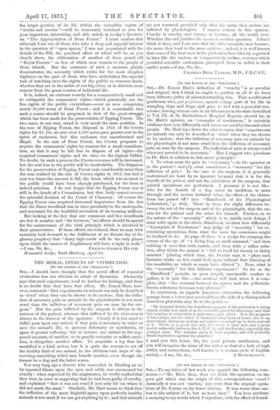THE MORAL EFFECTS OF VIVISECTION.
[TO THE EDITOR OF THE " SPECTATOR:]
SIR,—I should have thought that the moral effect of repeated vivisection was too obvious to admit of discussion. Abernethy says that such experiments tend to harden the feelings, and there is no doubt that they have that effect. Mr. Ernest Hart, how- ever, contends "that experiments on animals can only be described as 'cruel' when they can be shown to be useless ; that the inflic- tion of necessary pain on animals by the physiologists is not more cruel than the infliction of necessary pain on man by the sur- geon." But the pain inflicted by the surgeon is always in the interest of the patient, whereas that inflicted by the vivisector is always in the interest of the operator. Clearly it is not cruel to inflict pain upon any animal, if that pain is necessary in order to save the animal's life, to prevent deformity or mutilation, or spare it greater suffering; but to torture one animal in the sup- posed interests of another, or to gratify curiosity or selfish ambi- tion, is altogether another affair. To amputate a leg that has mortified is a kind action, but it is quite the reverse to cut off the healthy limb of one animal, in the ofttimes vain hope of dis- covering something which may benefit another, even though the former be a dog and the latter a man.
Not very long ago a drover, who succeeded in blinding an ox by repeated blows upon the eyes and orbit, was summoned for cruelty ; when reproved by the magistrates, he coolly replied that they were in error in supposing that he had been guilty of cruelty, and explained "that it was not cruel if you only hit 'em where it did not mark the meat." Similarly, Mr. Hart seems to think that the infliction of the most frightful agony upon perfectly healthy animals is not cruel if we can get anything by it ; and that animals are not tortured, provided only that the pains they endure are inflicted by physiologists. I cannot concur in this opinion. Cruelty is cruelty, and torture is torture, all the world over. Whether the end justifies the means is another question. I don't think it does, and I am sure that the older scientific men become, the more they tend to the same opinion ; indeed, it is well known that some of the best men in the profession have bitterly regretted in later life the useless, or comparatively useless, tortures which youthful scientific enthusiasm prompted them to inflict in their earlier years.—I am, Sir, &c., CHARLES BELL TAYLOR, M.D., F.R.C.S.E.


































 Previous page
Previous page